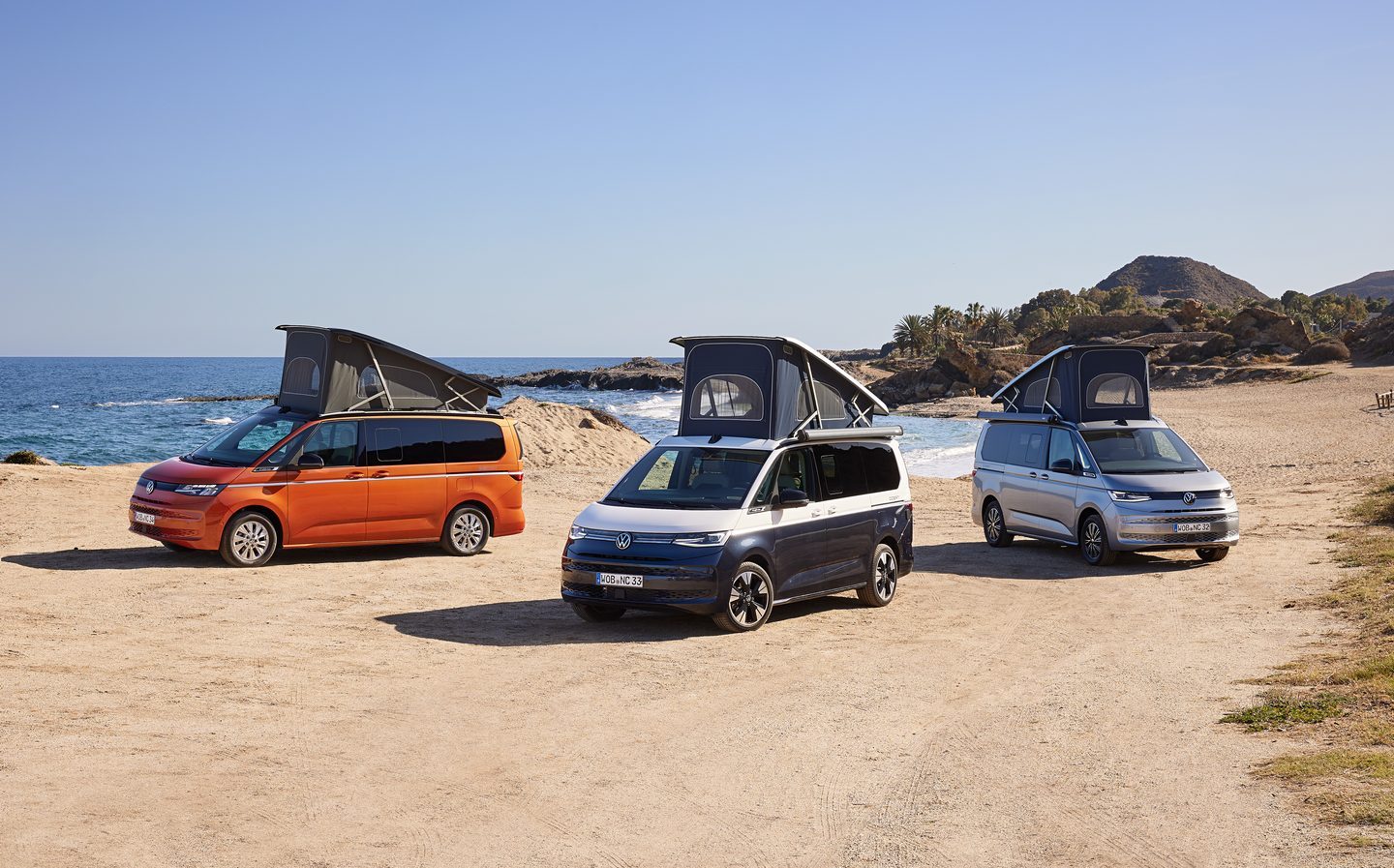New Volkswagen California camper based on car underpinnings and available as a hybrid
California dreaming
Volkswagen has revealed its new mid-size California camper, and there will be an electrified version for the first time. Petrol and diesel models will be joined by a plug-in hybrid, enabling short distances to be covered using zero-emissions power.
Volkswagen Commercial Vehicles has confirmed that there won’t be a pure-electric California based on the ID. Buzz due to lower-than-expected demand for such a product.
The new California is built using the MQB platform, which underpins a number of Volkswagen Group models including the VW Golf, Skoda Kodiaq and Cupra Formentor. Volkswagen derives the California from the extended version of the Multivan, an MPV launched in 2021.
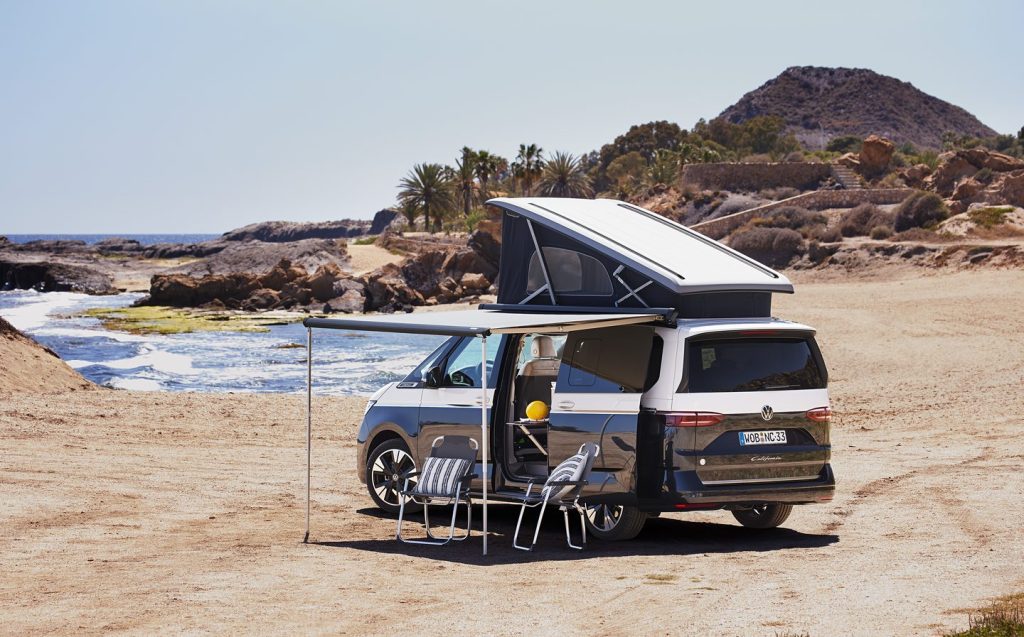
In terms of dimensions, the new California is longer and slightly wider than its predecessor, measuring 5,173mm in length and 1,941mm in width. Crucially, it remains under two metres in height, meaning it can fit into most multi-storey car parks and standard parking spaces.
This is one of the key features of the California’s popularity among the camping community; not only can it access more places but it is also more practical on a day-to-day basis, with many existing owners using them as daily vehicles.
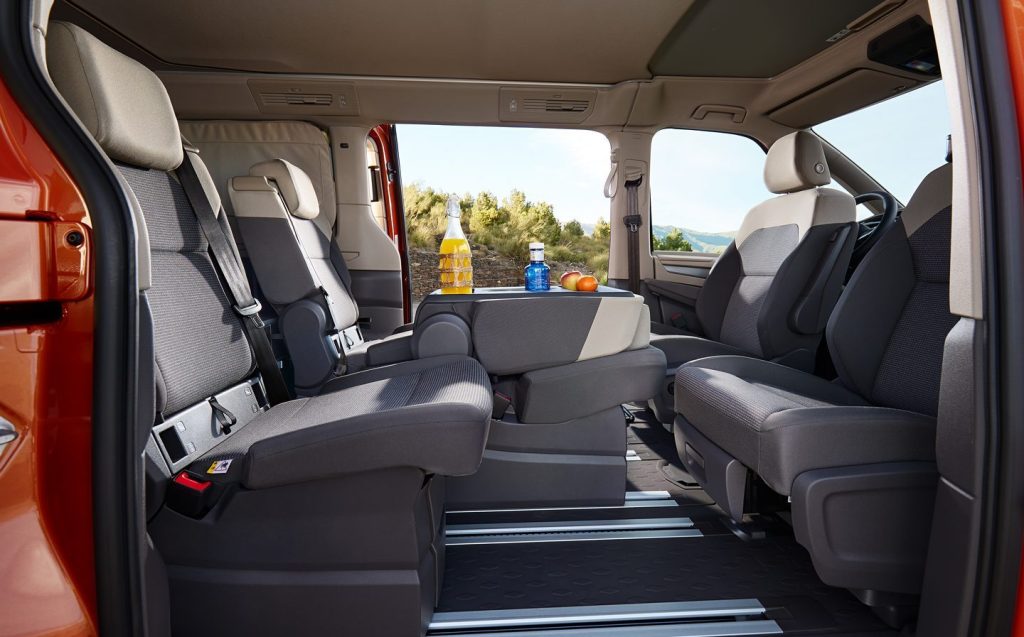
Where the new California differs in comparison to its predecessors — other than the non-van-based roots — is the use of sliding rear doors on both sides of the vehicle; previously, only one side had access.
Five different models
Volkswagen will offer five disparate versions of the new California, ranging from a six-seat passenger version that suits overnight or weekend trips to fully kitted-out campers that owners could travel in for extended periods. All versions come with a pop-up roof with three-layer bellows, windows and mosquito nets to keep any unwanted visitors at bay.
The California Beach is the most basic version and is classed as a passenger car. Its six-seat layout comprises three rows of two chairs, with the rear seats easily removable. There are storage boxes underneath each seat, too.
Other clever packaging solutions include a folding table that can be secured in the storage compartment.
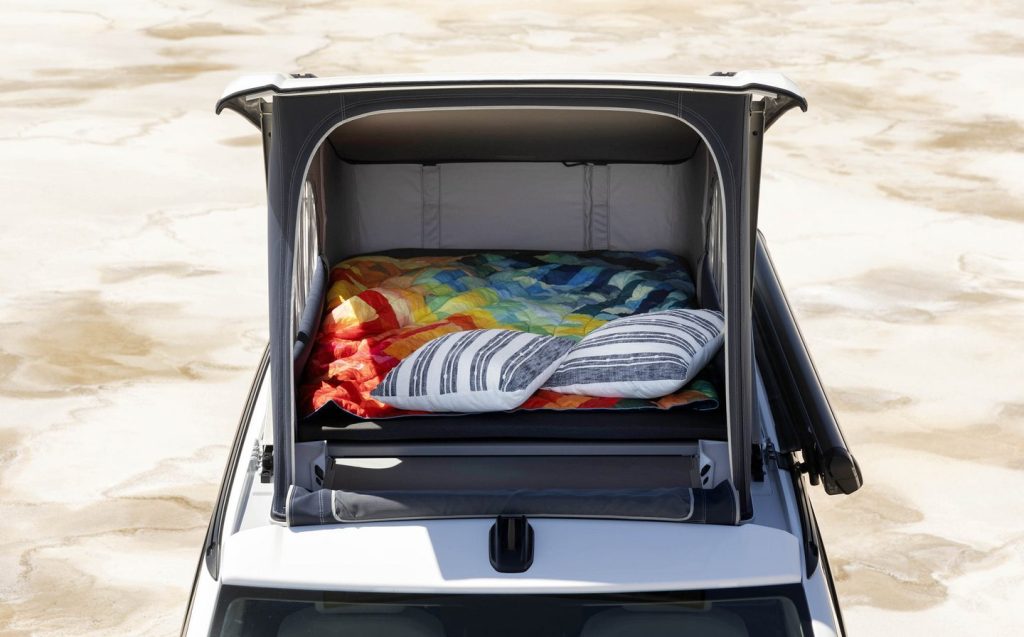
Upgrading to the California Beach Tour adds useful features such as swivelling front seats to create more usable space inside, illumination in the pop-up roof, sliding windows in the rear doors and a touchscreen display for controlling all of the interior functions.
A long-life battery that can run many of the interior functions for hours without the need for the engine to be on is also included at this level.
Owners can also use a smartphone app to access the California remotely to do things such as activating the auxiliary heater when making their way back to the campsite at night.
The California Beach Camper, meanwhile, has some additional features to make it better suited for camping, including a 230-volt power connection and a small kitchen with dedicated storage space in the boot that can be pulled out when in use. This unit has a single-ring gas cooker and built-in cutlery drawer.
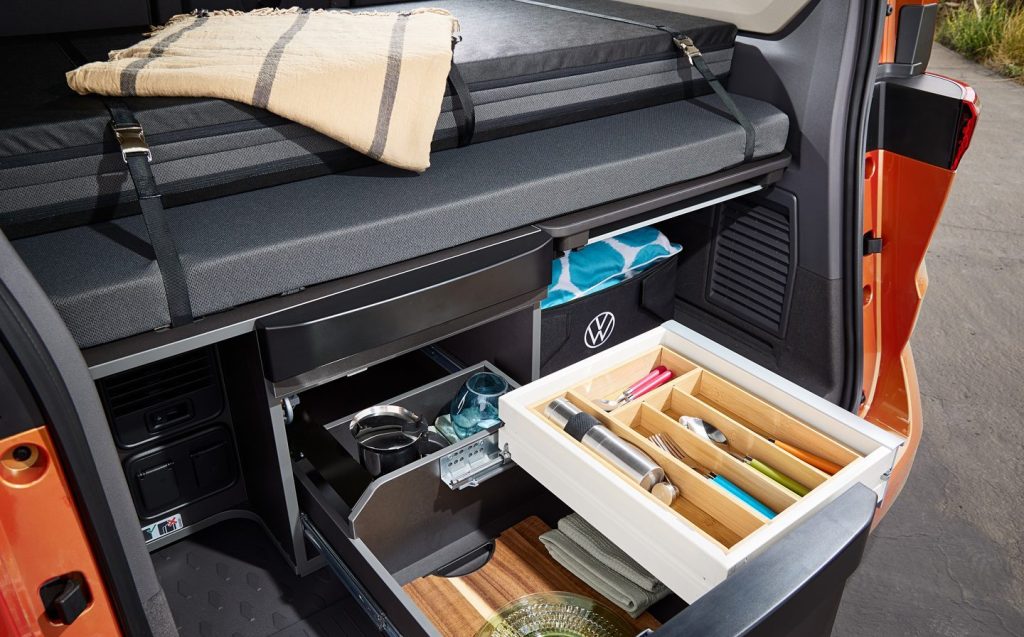
Volkswagen’s new camper comes into its own with the four-seat Coast specification. On the left side of the camper, a full kitchenette design comprises a single-ring gas cooker, sink and cabinets. This redesigned unit is smaller than the previous California’s without losing out on the amount of storage it offers.
Thanks to the extra sliding door, the built-in refrigerator is accessible from outside the California for the first time. Both front seats can swivel through 180 degrees to face into the living area. The rear seats can also fold flat to create a second sleeping area.
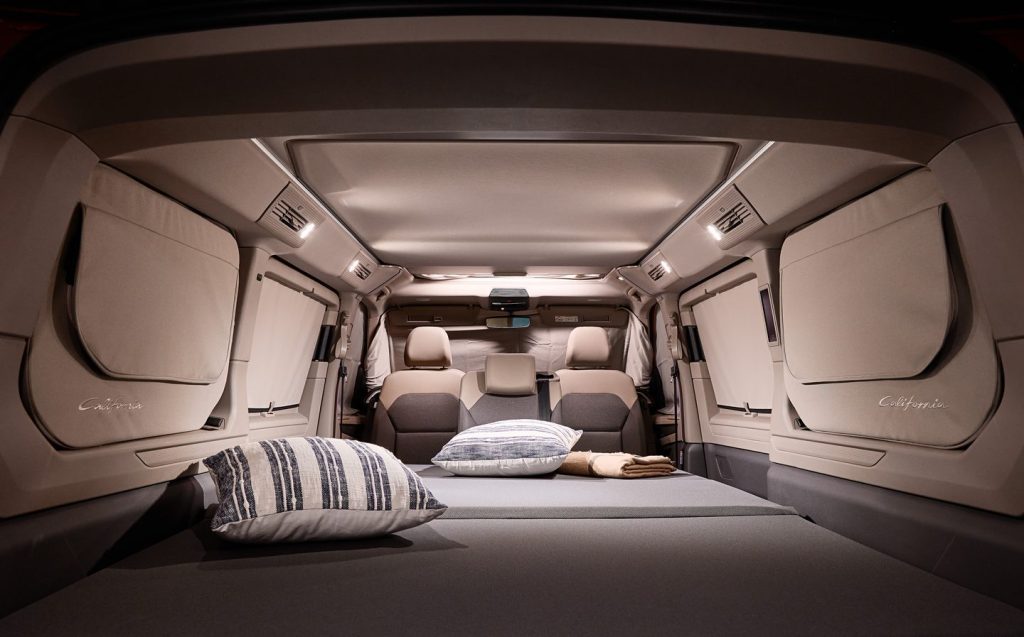
Topping the five-strong range is the California Ocean. The flagship camper is equipped with exclusive upholstery made from recycled materials, while the California lettering is embroidered into the backrests of the heated front seats.
There’s an auxiliary cabin heater and automatic air conditioning, and both the Coast and Ocean are fitted with a 28-litre freshwater tank, as well as an additional 230-volt power socket on the exterior.
Petrol, diesel or plug-in hybrid
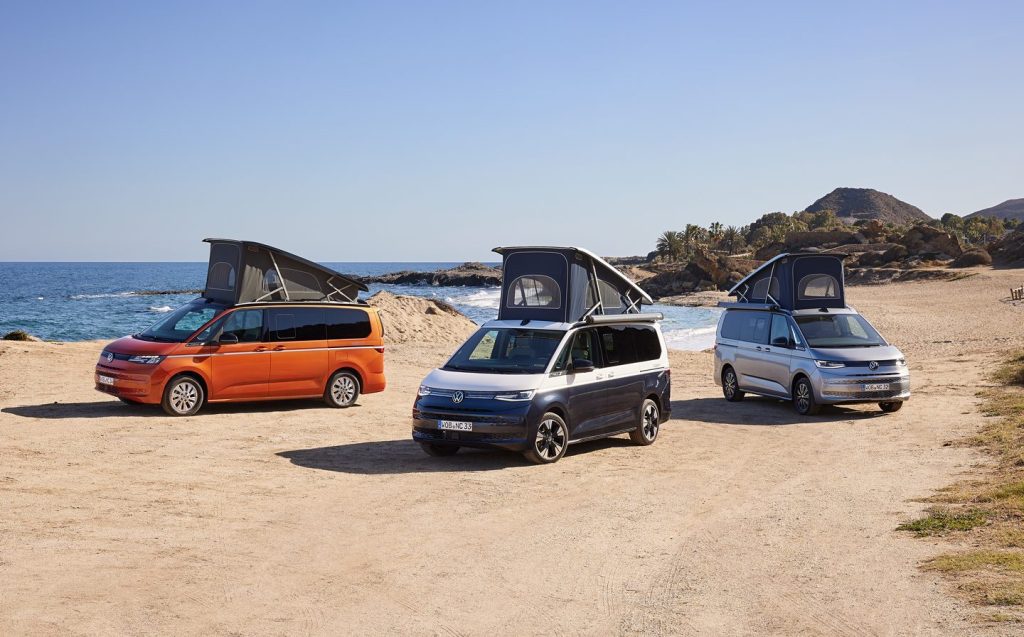
The California will have a selection of engines, starting with a four-cylinder petrol engine producing 148bhp, though the 2-litre diesel with 201bhp should be popular with those who tour over longer distances and prefer extra torque (twisting force from the engine) for hilly terrain.
The bigger news is the introduction of a 1.5-litre plug-in hybrid, equipped with 4Motion all-wheel drive and a maximum power output of 241bhp with a towing capacity of 2,000kg. Electric motors potentially offer even more torque than diesel, and from zero revs.
Volkswagen hasn’t confirmed what the electric-only range for the PHEV will be, but it is expected to be less than the 31 miles the Multivan eHybrid can cover on a full charge of its battery. It could prove enough for trips from campsites or holiday homes to beaches, though.
Volkswagen will open the order books for the new California in June, with deliveries expected to begin at the end of 2024 or early 2025.
Related articles
- If you liked reading about the new Volkswagen California, you might be interested in the VW Caddy-based California camper
- Check out the Volkswagen camper set by Lego
- Did you see the camper conversion for the Tesla Cybertruck?
Latest articles
- Bedeo Defender 110 2024 review: Does electric Landie with in-wheel motors make for a perfect off-roader?
- F1 2024 calendar and race reports: What time the next grand prix starts and what happened in the previous rounds
- BYD Seal U 2024 review: Chinese brand adds plug-in hybrid SUV to its electrified line-up
- New Mini John Cooper Works revs up for Nürburgring 24-hour race debut
- Ineos Grenadier Quartermaster 2024 review: British pick-up is a tough mudder but too flawed to be a real workhorse
- Mini Cooper SE 2024 review: All-new electric hatchback is playing to the crowd
- Jeep Wrangler 2024 review: Impressive off road but you’d still have to be a committed contrarian to buy one
- Around 500 Ford workers in UK could go on strike over cost-of-living pay dispute
- Durham solar car team to take part in 24-hour race with smart tyres and night-driving solution


